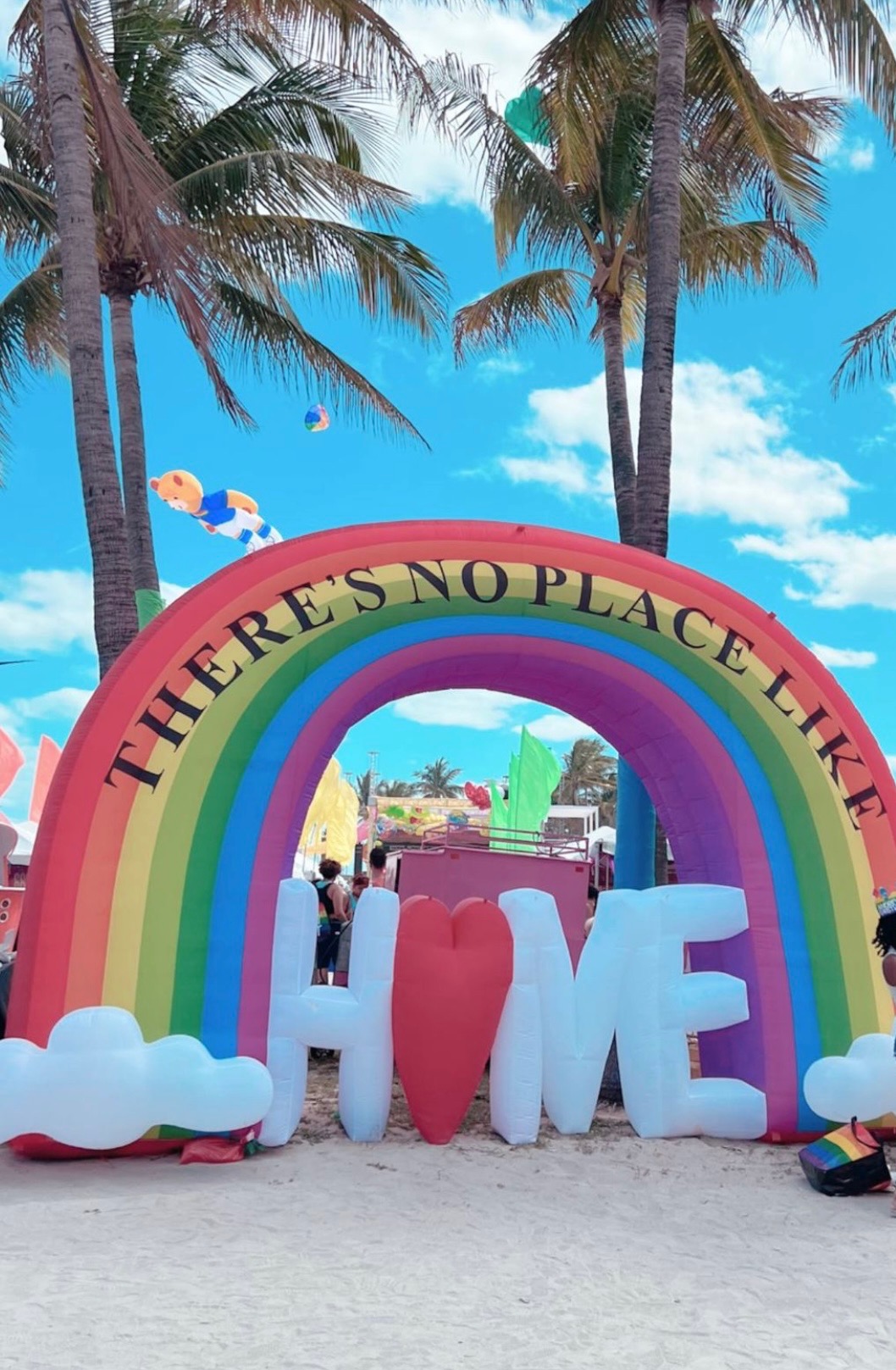At the beginning of April annually, Ocean Drive gets gayer in anticipation of the city’s largest Pride event of the calendar year. For the past two years this was not the case due to COVID-19, with last year’s Pride occurring in September and the pandemic stomping in the way of any 2020 events.
The celebration lasts ten days — this year from April 1-10 — with the final day signaling the grandiose parade followed by an all-day festival with celebrity headliners. This year’s list included popular British, EDM-pop musician RAYE, whose performance lit up Lummus Park with celebratory dance pop.
I was impressed by the diversity of Pride attendees. This year’s festival felt more representative of the rest of the LGBTQ+ community than past Miami Beach Pride events.
There seems to be a trend in Miami (and much of the queer community) that more conventionally attractive, white, muscular gays take center stage and dominate the party. I’m not saying that they weren’t still making their presence known with their speedos and “Ken Doll” bodies, but for once that thankfully wasn’t the only part of the community in my face.
This is not saying that these gays should not continue to attend and I am in no way speaking down on them. I respect their presence and I uplift anyone promoting body confidence. I’m just saying that Pride is for everyone and everyone should feel included. I know I was nervous before my first Pride because my concept of Pride was shirtless, buff, cisgender men stomping around and that was not the case.
It’s heartwarming to go to a school so supportive of Pride events, as Sebastian the Ibis was dressed and ready for the parade with a large group of UM students and faculty. The LGBTQ+ Student Center at UM does so much to uplift the queer community and it was nice to see their smiling faces in attendance.
I was happy to see tents sporting trans and nonbinary merchandise, as well as opportunities for all members of the queer community to educate themselves on those communities’ political issues.
Taking place shortly after the controversial “Don’t Say Gay” bill signed into law by Florida governor Ron DeSantis, politics was everpresent, as it should be. It seemed as if everywhere I looked there was a “Say Gay” poster, an MC chanting the phrase or someone sporting anti-”Don’t Say Gay” merchandise.
But there was one large issue clouding up the entire event and parade: corporations.
I’m not someone who usually complains about this, but it felt like everywhere I looked there was another major company boasting their pride merch and a signature colorful logo. In a post-BLM universe where performative activism is discussed heavily, it was easy to think of this.
Whether it was Coca-Cola, Publix or Celebrity Cruises, corporations were omnipresent. The irony in this is that some of these corporations are the same ones in the news last month for donating to politicians who support “Don’t Say Gay.”
There is a complicated relationship between large-scale businesses and the gays. While some, such as Absolut vodka, were among the first to truly petition for the community and the gratitude is present, the majority weren’t early supporters and may be hopping on the bandwagon now.
While sponsors are important to afford a large-scale event and their donations can make it a bigger celebration, it can feel performative. Why is Pride the only time I hear a word about gay rights from these companies? Are they just trying to take my money and then scrap their temporary rainbow logo next week?
Of course, people could ask whether these corporations just want to be allies. It’s a great thing that so many straight people are celebrating Pride, but it is wrong if executives believe they can skate by with just a float in the parade and keep their mouths shut the rest of the year.
In June 2021, The Guardian published a report detailing twenty-five major corporations, including Walmart, AT&T and Comcast, some of whom were present at Miami Beach Pride, that donated more than $10 million to anti-LGBTQ+ legislation. All of these companies slapped a rainbow on their logo during June and advertised themselves as gay-friendly, however. Walmart’s website even features a “Pride & Joy” section, capitalizing on Pride while donating against the queer community.
Also, why were there dozens of rainbow cop cars invited to the event? I could go on for days about the complicated, brutal history between the police force and the queer community.
There are reasons why cops should not be at Pride. Fighting back against police brutality is one of the major reasons why the first Pride had to happen. Up to this day, police specifically have a negative impact on the lives of trans individuals, and I wish cops could just accept that they’re part of a community with a rich history of anti-queer actions.
Let’s not let Pride just be a celebration, but an ongoing event to make light of continuing oppression in our community.
Overall, Miami Beach Pride is a fabulous event that uplifts queer voices and I am so glad that the event finds its way to South Beach every year. I can only hope that a couple cogs in the wheel are solved for the future.







